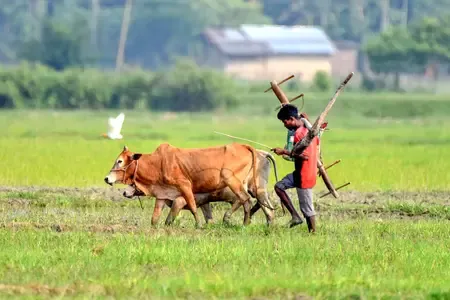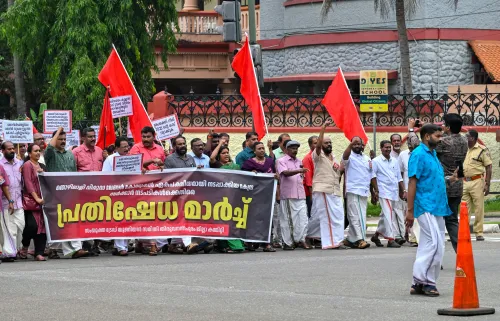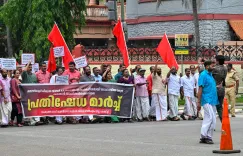Is the Government Justified in Refusing Moong Procurement?

Synopsis
Key Takeaways
- Farmers are facing significant financial losses due to the government's refusal to procure moong at a fair price.
- Environmental concerns over herbicide use are central to the procurement dispute.
- The Chief Minister is exploring alternative market strategies to assist farmers.
- A legal battle is brewing as farmers prepare to challenge government claims.
- The situation highlights the broader challenges in Indian agriculture.
Bhopal, June 13 (NationPress) In a region where agriculture is critical to rural income, a rising conflict over moong (mung bean) procurement in Madhya Pradesh has generated both anxiety and tentative hope.
The farmers' organization has announced plans to approach the judiciary regarding the government's refusal to buy moong, allegedly due to claims of toxic substances.
“To expedite the drying of summer moong crops, farmers resort to herbicides like paraquat and glyphosate. These chemicals accelerate crop maturation but are detrimental to the environment and pose health hazards to consumers. The application of herbicides diminishes beneficial soil microbes, leading to a decline in soil fertility. Moreover, summer moong requires multiple irrigation cycles, further exhausting groundwater resources,” stated a press release from the state government, quoting Prof (Dr.) Vijay Singh Tomar, former Vice Chancellor of Jawaharlal Nehru Agricultural University, Jabalpur, and Rajmata Vijayaraje Scindia Agricultural University, Gwalior.
A press release dated May 8, titled 'Discourage use of herbicides in moong cultivation,' outlined further reasons for its contamination. “This declaration has negatively impacted the commodity, causing prices to plummet and exacerbating the troubles faced by farmers. We are preparing a petition to challenge the designation of moong as a ‘toxically contaminated commodity,” said Shivkumar Sharma, National President of the Rashtriya Kisan Majdoor Mahasangh, in an interview with IANS.
With the state government yet to commence moong procurement at the support price this season, the situation has united farmer organizations, policymakers, and civil society. Meanwhile, Chief Minister Mohan Yadav has proposed alternative strategies, including inviting private traders and Farmer Producer Organizations (FPOs) to engage in mandi auctions. He hinted at lowering mandi fees and providing new licenses to enhance competition and elevate prices to approximately Rs 7,500 per quintal.
“I will confer with the Union Agriculture Minister and farmers’ groups. Our administration is attentive to this matter and will make a decision that benefits farmers,” he informed the media.
A delegation from the Bhartiya Kisan Sangh, headed by Kamal Singh Anjana, President of the Madhya Pradesh unit, met with the chief minister, but the outcome was not favorable.
Farmers have staged minimal protests in Gadarwara, Pipariya, and certain areas of Narmadapuram district. Farmers’ associations have issued an ultimatum to the state government, demanding that procurement commence by Saturday or face statewide demonstrations. Their demand is driven by a stark price difference: while the MSP for moong in 2025-26 is set at Rs 8,768 per quintal, farmers are compelled to sell their harvest for Rs 5,000 to 6,200, incurring losses of up to Rs 2,000 per quintal.
“They will not finalize procurement this year since it is not an election year. Regarding the protest, organizing a statewide demonstration is challenging due to the approaching rainy season, as farmers need to prepare for Kharif crops,” Sharma remarked.
This year, moong has been cultivated across 12 to 15 lakh hectares in Madhya Pradesh, especially in districts such as Narmadapuram, Jabalpur, and Bhopal, according to government data.
Approximately 70 to 80 percent of the crop has been harvested; however, many farmers are withholding their produce in anticipation of better prices.
Union Agriculture Minister Shivraj Singh Chouhan has expressed willingness to procure moong under the Price Support Scheme (PSS), contingent upon the state government submitting a formal request. The Centre has already approved the procurement of over 54,000 metric tonnes of moong from states like Uttar Pradesh, Gujarat, and Haryana, and has extended procurement opportunities in Andhra Pradesh to assist farmers.









